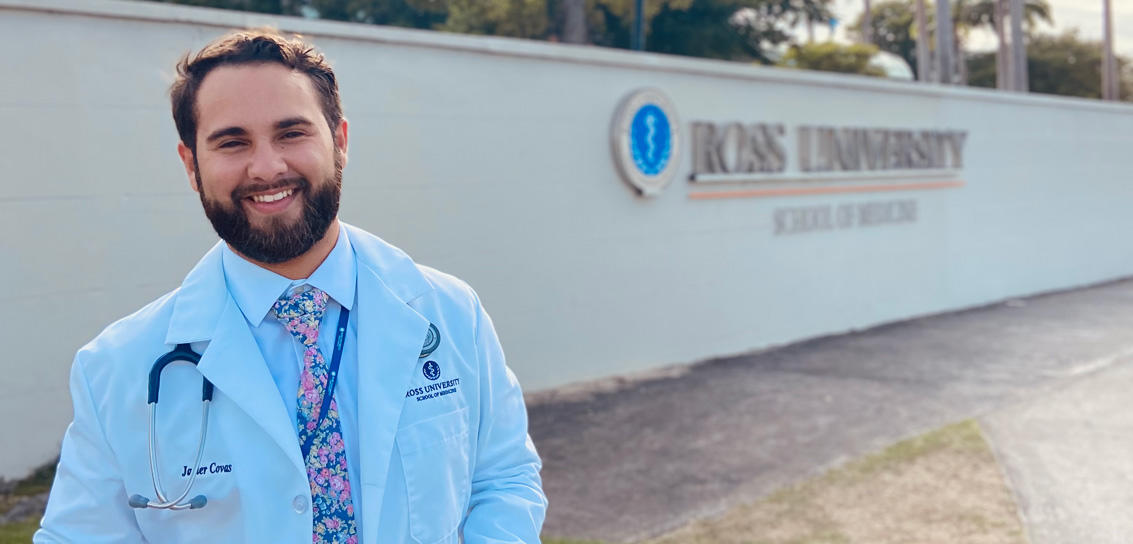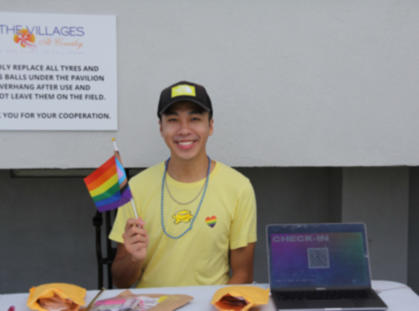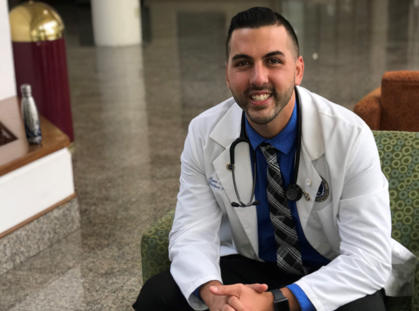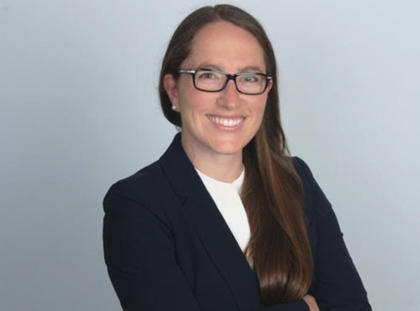Growing up in Puerto Rico, Javier Covas had a passion for science. He imagined a career in research, but his older sister’s dedication to helping others inspired him to follow in her footsteps and pursue a career as a physician.
Together they would go out with a group of volunteers in a small truck to provide clothes, food and medical care to homeless people in need.
“I saw firsthand how my sister was the first to respond, and the impact she had. I also wanted to be that person who is the calming hand in times of uncertainty,” Covas says.
In college, he studied science and completed summer internships with physicians. He loved interacting with patients. He also experienced natural disasters — including Hurricane Maria when the island didn’t have electricity or water for months — that solidified his desire to become a doctor. He wanted to be helping on the front line.
Finding a Family at Ross Med
Covas wanted to go to medical school away from home but not too far from the culture he was familiar with — he’s an avid surfer, paddleboarder and scuba diver. After researching med schools in the Caribbean, he was impressed with the faculty at Ross University School of Medicine (Ross Med). The university’s Access and Inclusion in Medicine (AIM) Scholars Program helped finalize his decision.
At Ross Med, he found just what he was looking for: a family of students from similar, as well as different, backgrounds.
“In Barbados, one of my closest friends is Muslim, and prior to med school I had never met anyone who is Muslim. It’s really fun and enriching to see everyone working together,” he says.
Covas became involved with Ross Med’s Latino Medical Student Association, serving as chapter president for three semesters. “It was a much-needed place for Latinos. We have a saying, ‘la casa lejos de casa,’ the home away from home. We like to provide a safe space for every Latino. But it’s not just for Latinos. Many students from other cultures joined the chapter.”
The chapter started hosting workshops on basic Spanish and medical terminology to help students become more culturally sensitive physicians and to help address the health disparities inherent to those who are Spanish speaking.
“I know many of the students who took the workshop aren’t going to become fluent Spanish speakers. But I wanted to let them know, you are going to encounter a Spanish-speaking person and it would be nice if you can try to understand where this person is coming from,” Covas explains. “It’s culture, it’s not just language. It shows that this doctor cares.”
A Career of Impact
Covas is looking forward to clinical rotations in December. He feels drawn to the specialties of infectious disease and pathology, as well as psychiatry. One thing he knows is that after he finishes his medical education, he’d like to practice in the U.S. and return home to Puerto Rico. There he plans to start a medical nonprofit to give back to his community.
“When I started studying, there were a lot of things going on back home and I felt overwhelmed,” he says. “But one of my professors told me, the best thing you can do right now is grow as a person, continue your career, and then you can make your impact. Be the best version of yourself, so you can help others.”
Covas has taken that advice to heart as he continues his third year of medical school. He realizes how much work and dedication it takes, but most importantly, that this is his true calling.
“Med school is not for everyone. It’s a long, hard journey but it’s fulfilling,” Covas says. “It’s amazing once you put in the work. You don’t have to be the smartest person in the room, you just have to be dedicated and want to help. And once you find that motivation, there’s nothing stopping you. Be true to yourself.”
Get started on your own path to making an impact in the communities you will serve here.




